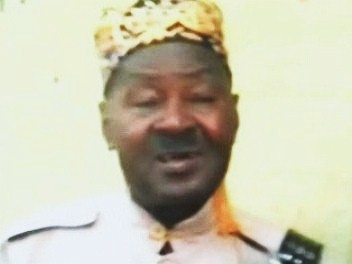Blog Archives
Salia Koroma: Of Imps And Human Bondage
The story in Njawima Meme is very simple. At first glance at least. It is a story of a master-slave relationship, one of dominance and control, of power and impotence inverted.
A Ndohgboh Joso goes fishing, but as it puts the only fish that had been in the weir trap into the fish basket, the fish wriggles out of its hands and into the stream (njawi). To recover this loss, it spends a fruitless morning fishing. It returns to its lair, only for its human captive to tell it to go back to the stream, that if it doesn’t come back with the particular fish that had slipped away death awaited him on his return. That’s a bind for a spirit to find itself in.The song is an expression of the predicament of the Ndohgboh joso.
But even this explanation of the song doesn’t make sense without a knowledge of the Mende folklore about Ndohgboh Joso/Yoso. Ndohgboh means bush, and Joso means magic, but that doesn’t mean much, does it? A Ndohgboh Joso is then a magician of the bush, a malicious, some would say evil, spirit that takes on the shape of a man, short of stature (not a dwarf, a completely different forest spirit) and rather unattractive. It’s best known for leading lone travellers astray and keeping them captive if they do not recognise its nature on their first encounter. The human would eventually become the spirit’s slave.
Now if you were a captured traveller but you somehow managed to keep your wits about you, there’s a chance of escape within the first few days. The idea is to make impossible requests, like asking the spirit to fetch you drinking water in a fishing net. The cool-headed captive can thus reverse the master-captive relationship. In the end the imp would be obliged to return its human captive (now master) to the nearest village.
Isn’t it interesting how fishing, the impossible ‘feat’ of catching the right fish, features in Salia’s imagination? Isn’t it interesting that there’s often a power dynamic involved?
Salia Koroma: Love & Misadventures In The Hinterland
Don’t think you’ll improve yourself and expect not to be the subject of gossip.
Even as I do this they go on about me. What did I do?
They say because I’m wandering about.
But who is it in the world that doesn’t travel?
A self-serving question, surely? A peripatetic life will keep tongues wagging, especially when a story told with a knowing wink caps each tour. So what do we have here?
1) Salia goes to Kayima, in Kono country. He strikes up with an unnamed woman, who leaves him penniless.
The one and only bobani she gave me/Is what I came and pawned for a drink.
But the nameless woman here will put in a proper appearance, complete with a face and back story, in another song.
2) He leaves Jimmi Makpe with nine yards of shirting and arrives in Bauya. In Bauya Salia hands over threes yards to the local tailor, who goes on to sew the tightest fitting shirt ever. The pocket “was under my arm.” The shirt hung on him while he cried out in pain. Salia implies that Saffa, the tailor, has kept some of the cloth for himself. He complains to anyone who would listen, but the common reply is: Saffa’s a freeborn (mahalo, literally meaning “a chief’s child”). Salia goes on to play on the name of the town: Bauya means Salvation, Haven. “Teh nya bawo Bauya” (They wouldn’t save me in Bauya).
The vagrant is always at the mercy of his hosts. Perhaps this is what Salia Koroma was saying, that the fact that he was himself a freeborn (a complicated, delicate question in old Mende) didn’t matter in a strange town where the locals accrue to themselves certain obscure advantages.
Sometimes There’re Things You Just Can’t Avoid
I’m going ahead to post another Mende Gendei, albeit this one a live performance. In my previous post I mentioned that he had sung the truncated version before he was asked to perform the longer version with its litany of chiefs. This is that shorter version.
Of his numerous compositions, was Mende Gendei Salia’s favourite “accordion tune”? This is a question that needs asking. If it wasn’t, then
it would appear that he put aside any concerns about it being a burden and eventually embraced the popularity of this particular composition.
And of his many compositions, this is the most “textually” consistent across all versions ( and Salia’s compositions are very consistent across versions). Had Salia been a man who could read and write, I’d have arrived at the conclusion that he had written down the text of this song and that he was singing off a piece of paper. (To which he would naturally have responded, “And what white paper is that?”) The one line that is different (perhaps because the audio is better here) is : “The Rice Barn’s end are the Supporting Pillars,” where the others sound like: “The Forest’s end are the Trees.”
Or it could be that I just need to have my hearing checked. Tell me what you hear in the different versions.

